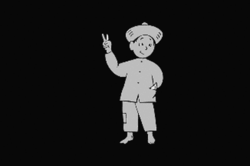
Juan Bimba
Encyclopedia

Fictitious
For literary uses see FictionFor Legal uses see legal fiction*Fictitious defendants*Feigned action*Ejectment - an action to recover land*John Doe - commonly named as a fictitious defendant....
character used in the past as the national personification
National personification
A national personification is an anthropomorphization of a nation or its people; it can appear in both editorial cartoons and propaganda.Some early personifications in the Western world tended to be national manifestations of the majestic wisdom and war goddess Minerva/Athena, and often took the...
of Venezuela
Venezuela
Venezuela , officially called the Bolivarian Republic of Venezuela , is a tropical country on the northern coast of South America. It borders Colombia to the west, Guyana to the east, and Brazil to the south...
, but is now regarded as obsolete. According to the local folklore
Folklore
Folklore consists of legends, music, oral history, proverbs, jokes, popular beliefs, fairy tales and customs that are the traditions of a culture, subculture, or group. It is also the set of practices through which those expressive genres are shared. The study of folklore is sometimes called...
of the region of Cumaná
Cumaná
Cumaná is the capital of Venezuela's Sucre State. It is located 402 km east of Caracas. It was the first settlement founded by Europeans in the mainland America, in 1501 by Franciscan friars, but due to successful attacks by the indigenous people, it had to be refounded several times...
the name comes from a mentally ill local inhabitant of the 1850s; but this version is doubtful. It was first used by Juan Vicente González, a Venezuelan columnist of the 19th century as an example of the average Venezuelan peasant, the prototype of the common people. The cartoon was drawn by cartoonist Mariano Medina Febres in the 1930s
Use in politics
The name was used and preserved by Andrés Eloy BlancoAndrés Eloy Blanco
Andrés Eloy Blanco Meaño was an important Venezuelan poet, politician, member of the Generación del 28, and one of the founders of Acción Democrática ....
in several poems and in the Fantoches magazine. A sociopolitical essay
Essay
An essay is a piece of writing which is often written from an author's personal point of view. Essays can consist of a number of elements, including: literary criticism, political manifestos, learned arguments, observations of daily life, recollections, and reflections of the author. The definition...
by the poet, in 1936, revolving particularly on socialism
Socialism
Socialism is an economic system characterized by social ownership of the means of production and cooperative management of the economy; or a political philosophy advocating such a system. "Social ownership" may refer to any one of, or a combination of, the following: cooperative enterprises,...
and communism
Communism
Communism is a social, political and economic ideology that aims at the establishment of a classless, moneyless, revolutionary and stateless socialist society structured upon common ownership of the means of production...
in Venezuelan history, was entitled Carta a Juan Bimba («A Letter to Juan Bimba»).
Acción Democrática, one of the two leading political parties of Venezuela in the 20th century, used and further popularized the name and created an image to accompany the symbolism of their 1963 electoral campaign's motto: El Partido del Pueblo («The People's Party»), especially since the country's supreme court banned the use of their official flag. Recently, Venezuelan president Hugo Chavez
Hugo Chávez
Hugo Rafael Chávez Frías is the 56th and current President of Venezuela, having held that position since 1999. He was formerly the leader of the Fifth Republic Movement political party from its foundation in 1997 until 2007, when he became the leader of the United Socialist Party of Venezuela...
has been seen performing a humoristic version of himself as Juan Bimba, particularly during political campaigning tactics, portraying the image of a humble llanero
Llanero
A llanero is a Venezuelan or Colombian herder. The name is taken from the Llanos grasslands occupying western Venezuela and eastern Colombia. The Llanero were originally part Spanish and Indian and have a strong culture including a distinctive form of music.During the wars of independence,...
.
Other uses
Juan Bimbo is nowadays more commonly used as a placeholder namePlaceholder name
Placeholder names are words that can refer to objects or people whose names are either temporarily forgotten, irrelevant, or unknown in the context in which they are being discussed...
, an informal name for unspecified persons in certain Venezuelan regions.

